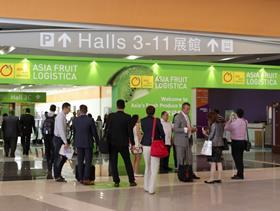
New ways to control rising perishable logistics costs will take centre stage at the 1st Cool Logistics Asia conference, taking place on 2 September in Hong Kong to coincide with the opening day of Asia Fruit Logistica, Asia's leading international trade fair for fresh fruit and vegetable marketing.
'In developed countries, the cost of cold chain logistics as a percentage of a product's retail price is between 10 per cent and 15 per cent. In China, it can be as high as 50 per cent,' says Clement Lam, director and general manager, Swire Pacific Cold Storage (SPCS), the leading cold store operator in Australia and Vietnam and one of the top five operators in the US.
SPCS has benefitted from knowledge transfer from its US and Australian cold chain businesses, but in terms of China it was 'effectively ground zero, a greenfield investment,' according to Lam. As of the third quarter of 2014, the company's first two wholly owned cold storage facilities - one at Fengxian, near Shanghai and the other at Langfang, in Hebei province - are now operational. In his speech at Cool Logistics Asia, Lam will assess cold chain capacity demand across the Asia Pacific region.
A perspective on India, the world's second largest cold chain market, will be provided by Pawanexh Kohli, CEO of CrossTree Techno-Visors. Kohli is also chief adviser to the National Centre for Coldchain Development, which has been tasked to create an integrated cold chain for perishable agriculture and horticulture produce across India.
According to a recent study by the Institution of Mechanical Engjneers, US$15bn will be spent on expanding India's cold chain in the next five years. TechSci Research's report India Cold Chain Market Forecast & Opportunities 2019 forecasts that the Indian cold chain market will grow at a CAGR of around 23.88 per cent during 2014-2019.
In his speech, Kohli will focus on the development of perishable gateways in Gujurat, including port connectivity via a network of ICDs and review revolutionary cooling techniques using up to 100 per cent recycled energy. He is also expected to discuss the creation of a new framework for dedicated refrigerated intermodal rail operations in India.
While rail-based intermodal operations, especially for reefer shipments, are usually limited by distance and operational constraints, shipping remains the preferred method for transporting high volumes of reefer containers between different continents using special reefer units developed by companies such as Carrier Transicold, Daikin and Thermo King.
However, could there be an alternative in the future? Henrik Christensen, President Global Logistics of KTZ Express Kazahkstan, will prove that it will soon be possible to 'extend the cold chain between Asia and Europe' by using self-powered reefer containers (rather than gensets) initially for high value cargoes such as pharmaceuticals between China and Germany.
'As manufacturing centres in China are moving further inland away from the coast, the advantage offered by container vessels connecting Shanghai or Hong Kong with Hamburg or Rotterdam could be challenged by direct temperature-controlled rail links between Chongqing and Duisburg,' said Alex von Stempel, Managing Director, Cool Logistics Resources.
The high-level one-day forum in Hong Kong will also feature speakers from leading shipping lines including CMA-CGM and MOL, international perishable logistics experts such as Chile-based Mauricio Padron, Australia-based Caesar Sanches of Panalpina, Alex Schenz of Arconz in New Zealand and Alfred Cheung from Green Society Association, and perishable cargo owners including IG International and AgroFair Europe, who will exchange experiences on how to create a roadmap for developing Asia's perishable supply chains of the future.






No comments yet